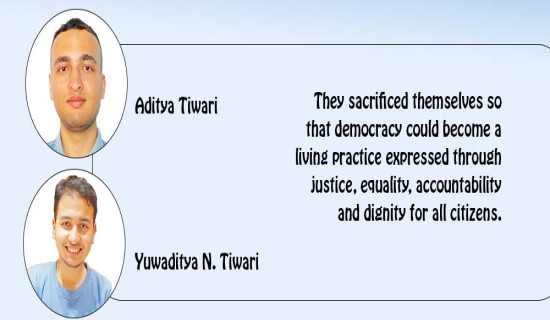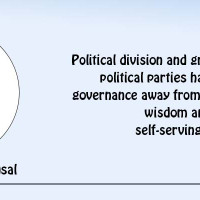- Friday, 30 January 2026
Check Tribhuvan University’s Freefall
In Nepal, the craze for English language used to be a well-known phenomenon. Pursuing major in English was considered a matter of prestige in the society after Science and Commerce streams. This scribe also chose to study English under the inspiration of his father when he joined college in late 1980s. There were several reasons behind the popularity of English. It was considered the language of elites. There was an impression that a person feels smug as he fluently communicates in English with other people. It is true that English has become a global language and crucial medium for modern education, knowledge, diplomacy, business and professional growth.
We have received a fanciful view about English from powerful rulers. Upon returning home from his visit to the United Kingdom in 1850, Rana prime minister Jung Bahadur invited two teachers from there to set up an English school at his own palace in Thapathali, which was known as ‘Durbar School.’ There was a time when Ranas had monopoly on English proficiency. However, with the political opening-up and expansion of education in the nooks and corners of the country, English was no longer a language of aristocrats. Ordinary people too started having an access to it and command over it. It is spoken widely and its acceptance has grown over the decades.
Dying fascination
However, a recent notice, issued by the Central Department of English, implies that fascination for the advanced English course is dying as the number of students to get enrolled for it has drastically declined. Alarmed by dwindling number of entrants, the Department has eased the criteria to enroll for the study of Master’s in English. As per this, one does not require to have major in English at Bachelor level. Individuals with Bachelor’s degree in any subject from Tribhuvan University (TU) or a Bachelor’s degree from any TU-affiliated university with 100 full marks are eligible for the enrollment. Likewise, those having completed Bachelor’s degree in any subject including English and received equivalent of Bachelor’s from TU or having completed Bachelor’s degree in any subject from any university of countries with English as a mother tongue and got equivalent as Bachelor’s level from TU are qualified for admission to MA in English programme. This updated criteria also applies to study Master’s in Nepali Department.
In the year of 1994 when this writer applied for admission to the Department, he was a part of an excited cohort waiting for the publication of a list of candidates eligible for the enrollment. That year around 200 students attended the classes divided into two sections. At one point, it also took students beyond its capacity. However, the scenario got reversed over the years. The decline of students to study Master’s in English reveals a broader picture: TU is now struggling to sustain its Departments particularly in Humanities and Social Sciences, with more and more students preferring to go abroad for higher studies after completing Ten Plus Two here.
There are also other important factors that dissuade students from studying in TU. They are – poor education quality, no job prospect, politicisation of administration, lack of innovation and investment in research and government’s policy to promote immigration of workers and students and brain drain. Some departments are on the verge of being shut down in the dearth of students, posing a moral question to the teachers and administration. This shows the erosion of academic and intellectual forte of the country as a whole.
The Central Department of Population Studies once used to fetch around 300 students annually but nowadays its classrooms are almost empty. Now only 12 students have enrolled the department but they do not attend the class regularly. It has 12 teachers, including two professors. Teachers arrive at the classrooms early in the morning but they return home without giving a lecture after no student appears in the room, according to a news report of Gorkhapatra daily. Last week, Associate Prof. Balkrishna Mabuhang wrote on his Facebook page: "I waited for students throughout my period, no student turned up. Who to blame for this or go to find the students."
Departments of Hindi, Nepali, Psychology and Linguistics also suffer similar problems. Central Department of Nepali History, Culture and Archaeology is considered to have sufficient number of students but it has only 55 students combining first and second semesters. "We have managed to pull these students on our own," admits Department Head Dr. Som Prasad Khatiwada. He lamented that students' organisations approach them only for donations. "If we fail to donate to them, they come to beat us up but we do not get protection from any side."
Wake-up call
This sorry state of TU, the nerve centre of nation's academic excellence, should be a wake-up call for our political leadership. Associate Prof. Mabuhang appears to be in a dilemma as to whom to blame for the plight of his department and the broader university. But the country's faulty economic and education policy as well as myopic political leadership is responsible for this situation. With the privatisation unleashed full swing, the state-run institutions fell into the shadow. As a result, they lost their capacity to govern and deliver on their objectives. By commercialising education, the successive governments showed no interest in improving the public education. Their concerns are confined only to appointing their cronies to the lucrative positions of the varsity. This is a reason why the appointments to the posts of Vice Chancellor and Rector often draw controversy.
The misplaced priorities and piled up anomalies have led to the erosion of quality, infrastructure and teaching standards of TU. So it is no wonder Nepali students are leaving the country in hordes to study in the universities with global reputation. Despite huge financial burden, they are lured to them for quality education, career prospects, exposure and cosmopolitan academic atmosphere available there. The time has come for all stakeholders to check the decline of TU that has the onus to produce holistic knowledge and preserve the nation's culture and history.
(The author is Deputy Executive Editor of this daily.)

















